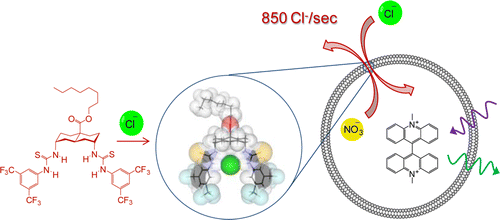
Hennie Valkenier, Luke W. Judd, Hongyu Li, Sabir Hussain, David N. Sheppard and Anthony P. Davis*
J. Am. Chem. Soc., 2014, 136, 12507–12512
Abstract
Transmembrane anion carriers (anionophores) have potential in biological research and medicine, provided high activities can be obtained. There is particular interest in treating cystic fibrosis (CF), a genetic illness caused by deficient anion transport. Previous work has found that anionophore designs featuring axial ureas on steroid and trans-decalin scaffolds can be especially effective. Here we show that replacement of ureas by thioureas yields substantial further enhancements. Six new bis-thioureas have been prepared and tested for Cl–/NO3– exchange in 1-palmitoyl-2-oleoylphosphatidylcholine/cholesterol large unilamellar vesicles (LUVs). The bis-thioureas are typically >10 times more effective than the corresponding ureas and are sufficiently active that transport by molecules acting singly in LUVs is readily detected. The highest activity is shown by decalin 9, which features N-(3,5-bis(trifluoromethyl)phenyl)thioureido and octyl ester substituents. A single molecule of transporter 9 in a 200 nm vesicle promotes Cl–/NO3– exchange with a half-life of 45 s and an absolute rate of 850 chloride anions per second. Weight-for-weight, this carrier is only slightly less effective than CFTR, the natural anion channel associated with CF.